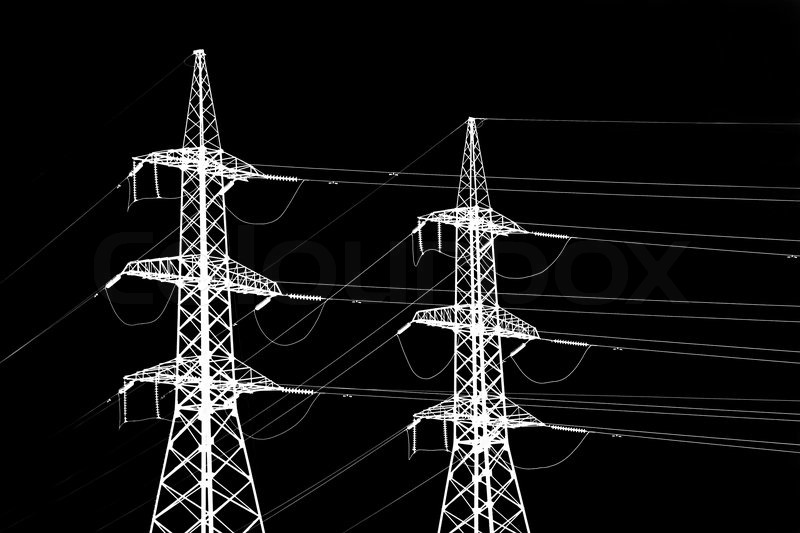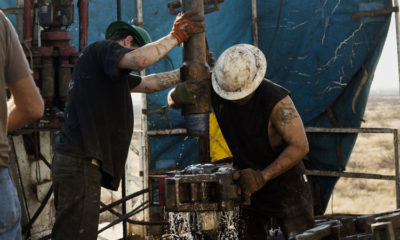Economy
Nigeria May Soon Be in Total Darkness — Egbin CEO
Published
8 years agoon

The Managing Director and Chief Executive Officer, Egbin Power Plc, Mr. Dallas Peavey, Jr., in this interview with says the nation may be enveloped in darkness in the coming weeks due to a myriad of challenges in the power sector.
What do you think about the Nigerian power sector almost three years after it was privatised?
I think at this point, we have gone through so many stages. I think the issue here is liquidity. So many of the owners came and they were thinking that they were going to be reaping some sort of returns after the first three years. In reality, nobody realised that they would go through three years and lose money. Our parent company owns Egbin as well as Ikeja Electric. Having said that, we cover a lot of the areas in Nigeria out of our own pocket. We, as a private company, don’t expect to do that.
I think the government is coming up with a plan and working with us to ensure that we get paid and continue to generate power, and go from the current generation of less than 4,000 megawatts to 10,000 MW in the next five years. At least, that is what we are hoping to achieve. We have got a long way to go, but I think we can get there.
Fuel supply is also an issue. The second is transmission; the system is older than Egbin, which is 37 years old. The transmission system is older than that, and they have not done anything towards the revitalisation of the system. They are trying to push almost 5,000MW to the system and it is not capable of taking that. We have to work with the Transmission Company of Nigeria and the government, because it is still owned by the government, to work through those issues.
How is the current economic recession in the country affecting your operations?
We have not laid off anybody and we haven’t cut back on salaries. We haven’t cut back on the mainstay of our workforce simply because we are hoping that we can rectify the gas issues. We hope that the liquidity issues will be resolved with the government so that we can get back to generating 1,320MW, because Nigeria needs power.
Transmission is often regarded as the weakest link in the power value chain, do you think the government should give it out on concession basis, or totally privatise it?
I can only give my opinion, and I think typically the transmission system is weak and probably could have been privatised earlier simply because that is the weakest link and it takes the most investment. I think that Manitoba Hydro is gone away; now, the TCN is back in the hands of the government. I think the government needs to take a look at how they are going to fund the projects that are necessary to strengthen the transmission network; even when we generate our capacity of 1,320MW, we are not sure the system can take that. And we are looking at doubling the capacity of the plant in the next three years. How are they going to take that? The government has to take a hard look at that.
Over the past three years, we have seen capacity upgrade at Egbin, with the plant now having available capacity of 1,320MW; what plans do you have going forward?
We are going to continue to work to ensure that we maintain the 1,320MW, and we just completed the environmental impact assessment for our phase two so that we can double the capacity of Egbin. Our plan is to have up to 3,000MW capacity in the next three years.
Do you have any plans to diversify your sources of fuel for the plant?
We already are doing that. We are looking at using Low Pour Fuel Oil. We are looking at using liquefied natural gas. We are looking at several options so that we are not depending upon the Nigerian Gas Company, because of the constant attacks on the pipelines. Nigeria needs power, even if we have full capacity, the nation needs over 10,000MW today. So, what we need to do is to continue to work with our owners and partners so that we can get fuel, and then work with the TCN so that they can take the power and get it to the nation. Right now, we have got almost 820MW stranded capacity that the nation needs.
Normal generation in Egbin is about 1,320MW. Currently, we are doing about 425MW, only 30 per cent of what we should be generating simply because of gas. The other side that we are having an issue with is that the TCN cannot take the full amount of power that we can generate. Right now, the biggest issue is gas, and we don’t know what the future is going to bring to us in terms of gas supply.
On top of that, we are owed over N86bn by the Federal Government; we have been producing but we haven’t been paid for almost six months. The last amount of money that we got was about 16 per cent of the total bill for the power that we generated for the month.
What are the implications if the debt is not settled as soon as possible?
We can’t continue to operate simply because we don’t have the money to pay for materials. We don’t have the money to pay for repairs and we can’t continue to pay our employers simply because we are owed so much money. We have gone out to banks and different financial entities to borrow the money to continue to do maintenance. You know for banks, the limit is only so much and we have reached that limit.
How has the exchange rate crisis affected your operations?
When we bought the plant three years ago, the exchange rate was N156 to the dollar. Today, the bank rate is N310 to the dollar, double of what it was then. This plant was built 37 years ago by the Japanese. And to do replacement and repairs, the foreign exchange rate is double. So, where are you going to find that? We are being paid in naira, but almost everything that we pay for is in dollars. So, the exchange rate is significantly impacting our ability to continue to operate as well and we are looking to the government to assist us on that, to come up with the solution for us to do that. Also, the scarcity of the dollar to be able to buy these spare parts and continue to do maintenance is impacting us tremendously.
But we, as a private company, have continued to dig deep into our pocket, go to our sister and parent companies to borrow money that the banks can’t loan us to continue to operate. But even so, if we don’t get paid and if we don’t get gas, we can’t continue to generate.
In terms of building power plants, we have not seen a lot in the sector in the past few years, why is this so?
It is a challenge because it requires huge investment. You have to have the capital to come in and build the power plant. A power plant like Egbin will cost you $600 to $700 per megawatt to build and install. Where are you going to find that much money, you are talking about $1.7bn to build the plant? That is a lot of investment. When you are not getting paid and you are owed N86bn, it is hard to attract investors in that kind of marketplace.
The Central Bank of Nigeria recently gave out intervention funds to power firms, what has become of that?
They didn’t give it to us; what they paid to some of the generation companies was what they owed them. It wasn’t guarantees; it wasn’t financing; it wasn’t loans. It was simply the obligations that they owed us; but then, we haven’t got any money. We are still waiting for it.
What do you intend to achieve with the Egbin plant in the next five years?
If we can continue to progress and move forward, by addressing the fuel supply, transmission and the liquidity issues, again we are looking at generating up to 3,000MW in the next three years from this plant alone. Right now, we currently provide 35 per cent of the power in Nigeria. That is a big step. Nigeria needs it and all we do here is to generate power.
Power supply appears to have improved slightly with generation rising above 3,500MW from a record low of 1,400MW in May amid militant attacks on oil and gas facilities, what is responsible for this?
That is because we have had more rains, leading to increase in generation from the hydro power plants. But in the next few months, there won’t be any more rain and so the output from the hydro power plants will dissipate and we will be back to generating from Egbin, because it is the largest in sub-Saharan.
Are you worried about the current state of the power sector?
Absolutely, because everybody is working so hard to come with the resolution but we need the government’s help and support because we need the money that it owes.
If that is not done any time soon, what will happen?
Then it is going to be dark in Nigeria soon.
Do you think the core investors who acquired the power plants are doing enough in terms of investment?
I think they have invested. Again, they have gone three years without any return. Second is that they have invested a lot of capital to get to this point. Lastly, they have explored every means of financial support that they can get, whether from banks, financial entities, the World Bank, IFC and others; and in our case, from our parent company. Everybody runs out money sooner or later if they don’t get paid.
What is the current level of Egbin’s indebtedness to the banks?
Right now, it is about $325m; how do you continue to sustain that? You can’t pay the principal, so how can you pay the interest? It is a difficult situation. We had to continue to borrow money to do the repairs, to buy the materials for the replacement of the pumps, modules and transformers because this is a 37-year-old plant; the equipment that we have is 37 years old. It wasn’t maintained when we bought the plant and so we continued to overhaul each one of the six units. We had to modify everything to do the repairs. The equipment that we utilise in the plant is not manufactured in Nigeria or Africa; so we had to go back to Japan, Korea and US to buy these spare parts.
Right now, because of gas and transmission issues, we only have three of our six units running. Each one of our unit can produce 220MW. For a megawatt, that is about 100,000 people that it provides power for. We are helping to stabilise the national grid. If you notice, over the last six weeks, we haven’t had a grid failure or system collapse because of Egbin. Egbin is the sole reason there has not been a total system collapse in the nation, because we regulate everything coming to Lagos all the way to Abuja and farther North.
Are you satisfied with the current electricity tariff?
We are not satisfied with the tariff simply because it is not functioning the way it is supposed to. It is supposed to cover your costs; today, it is not covering our costs. We have a shortfall because the cost of gas, the transportation of that gas and the cost of operating are far above the Multi-Year Tariff Order II. The MYTO II was set up to cover those costs, but it is not doing that. We are not looking for returns on our investment yet; we are trying to continue to invest in Nigeria but we have to be paid the bills to do that.
Does it mean you are not making any profit since you acquired the plant?
We have never made a profit. We are owed N86bn and we have lost $300m in the last three years directly out of our pocket because we haven’t been paid and because we have invested that money and we have got no returns. We don’t expect the returns immediately, but at some point, every business has to be able to sustain itself with profits or returns on its investment.
When do you intend to start making profits?
We don’t know. Right now, we are just trying to survive and that is not going on very well. We are hoping and praying that it is going to get better.
What specific policy or action do you expect from the government?
We need the government to pay its bills. Everybody is blaming the distribution companies; the government needs to pay its bills.
How has Egbin Power affected its host communities in the last three years?
Today, we were able to put together a programme to offer scholarships to academically excellent students and students from the local regions that otherwise would not have the opportunity to attend schools like Powerfields. We think what this is going to do is that it is going to enrich the communities, Egbin and the nation.
It is part of our Corporate Social Responsibility but it is also different. The scholarship is for a full year per student. It will cater for all the expenses and costs in the full academic year, and if they continue on with the excellence of their academic programmes, they will benefit from the scholarship programme to the university level. We have probably spent at least N750m in the last three years on our CSR programme.
Is the CEO and Founder of Investors King Limited. He is a seasoned foreign exchange research analyst and a published author on Yahoo Finance, Business Insider, Nasdaq, Entrepreneur.com, Investorplace, and other prominent platforms. With over two decades of experience in global financial markets, Olukoya is well-recognized in the industry.

You may like
-
Nigeria Joins BRICS as Partner Country, Strengthening Global South Cooperation
-
70 Million Poorest of The Poor Nigerians To Get N75,000 From FG
-
Nigeria Surpasses OPEC Quota with 1.51 Million bpd, Targets 2.06 Million in 2025
-
Global Investors Commit $7.6 Billion to Nigeria’s Development at AIF 2024
-
Nigeria-China Trade Strengthened as Grimaldi Introduces Direct Shipping Line
-
Nigeria’s GDP Records 3.46% Growth in Q3 Spurred by Non-Oil Sector













